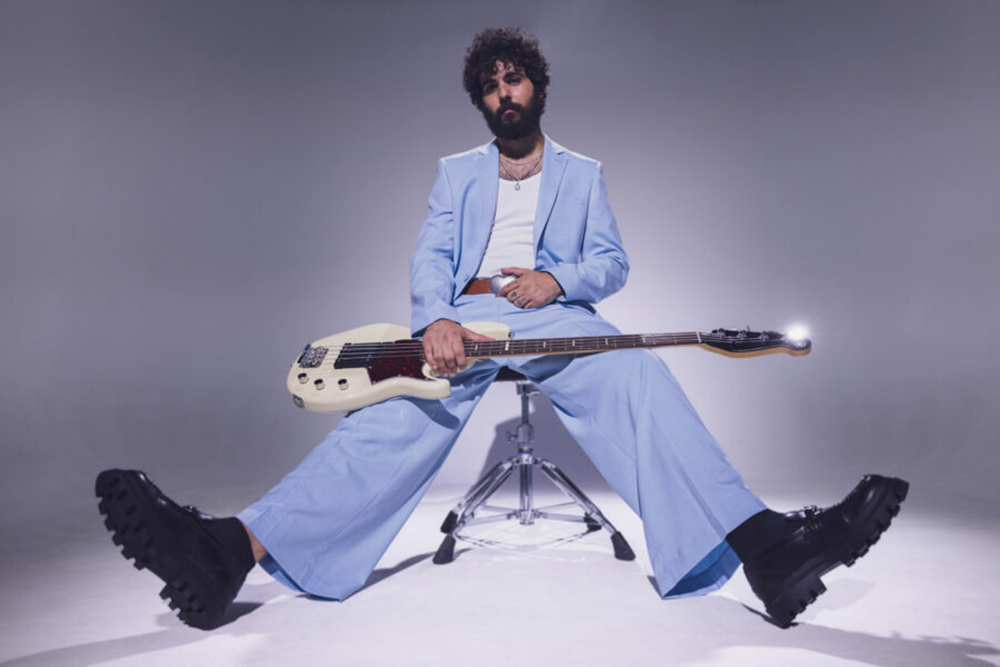
(CelebrityAccess MediaWire) After a successful test launch, Wal-Mart has launched its online Music Downloads service at www.walmart.com. At only 88 cents per song, the service delivers value, simplicity, and convenience with easy music downloads, thousands of exclusive songs and an expanded catalog of music.
Wal-Mart introduced a test phase of the online Music Downloads service in December to gauge customer feedback. As a result of this customer input, Wal-Mart has made a number of site improvements and added exclusive songs by top artists like Jessica Simpson, 3 Doors Down, Black Eyed Peas, Hilary Duff, Shania Twain, Shakira, POD, and JC Chasez — all part of a music catalog that has been expanded by more than 50 percent since the test phase.
In addition, Curb Records is making its songs available exclusively and for the first time on www.walmart.com for the next two months. The label, which includes more than 3,000 digital songs, is home to Tim McGraw, LeAnn Rimes, Jodee Messina and others. Also exclusively available for download on Walmart.com: the new singles by John Michael Montgomery and Gretchen Wilson, as well as songs by finalists of Oprah's "Pop-Star Challenge," including music by contest winner LaShell Griffin.
"Customer response during our test phase has been extremely positive, with strong customer demand across a variety of genres from rock, pop, and rap to R&B and country," said Kevin Swint, Walmart.com's director of entertainment categories. "The official launch of this new service is being supported in Wal-Mart stores nationwide with a comprehensive, integrated awareness program."
Site enhancements to the service include a new "download manager" that enables customers to easily download full albums and groups of songs. Also, customers will find it easy to shop their favorite music artists and discover new music through the enhanced search and browse functionality on the site. And, especially for novice downloaders, Wal-Mart's Music Downloads service offers 24/7 phone and e-mail support to meet the needs of its customers.
Customers have the flexibility to play downloaded music on their Windows PC, burn songs to a CD, or transfer music to compatible portable devices. The music files are available in WMA format. Usage rights are uniform across the entire catalog of music, simplifying the experience of owning downloaded music for customers.
The Music Downloads service was developed in partnership with Anderson Merchandisers, which supplies music to Wal-Mart and Walmart.com, and features a wide selection of songs provided by Liquid Digital Media, formerly Liquid Audio, a leading provider of digital media fulfillment services. Anderson Merchandisers acquired the assets of Liquid Audio in January 2003. –Bob Grossweiner and Jane Cohen
 Clear Channel Board OKs Stock Buyback Plan
Clear Channel Board OKs Stock Buyback Plan
 SAN ANTONIO (AP) — Clear Channel Communications Inc. said Tuesday that its board of directors has approved spending up to $1 billion over the next year for a stock-repurchase program.
SAN ANTONIO (AP) — Clear Channel Communications Inc. said Tuesday that its board of directors has approved spending up to $1 billion over the next year for a stock-repurchase program.
The buyback plan goes into effect immediately, the San Antonio-based media company said.
"This is a reflection of our board's confidence in the company's financial strength," chairman and co-founder Lowry Mays said. "We believe that the purchase of our common stock represents an attractive opportunity to benefit the long-term interests of the company and its shareholders."
Clear Channel, the nation's largest radio-station operator, said the company will base its stock purchase decisions on a variety of financial factors, and that shares repurchased will be held as treasury shares.
Clear Channel shares gained 40 cents Tuesday to close at $42.10 on the New York Stock Exchange. Over the past year, the company's shares have traded between $33.35 and $47.76.
 Broadcasters To Consider Code Of Conduct
Broadcasters To Consider Code Of Conduct
 WASHINGTON (AP) — Broadcasters meeting Wednesday to discuss indecency said they would consider an industry code of conduct, an idea the nation's chief telecommunications regulator suggested they should pursue.
WASHINGTON (AP) — Broadcasters meeting Wednesday to discuss indecency said they would consider an industry code of conduct, an idea the nation's chief telecommunications regulator suggested they should pursue.
Federal Communications Commission Chairman Michael Powell said if the industry leaves it to the government to set strict standards for broadcast decency, they won't like the result.
"You do not want to ask the government to write a `Red Book' of dos and don'ts," Powell told the gathering organized by the National Association of Broadcasters. "I understand the complaint about knowing where the line is, but heavier government entanglement through a `dirty conduct code' will not only chill speech, it may deep-freeze it. It might be an ice age that would last a very long time."
NAB President Eddie O. Fritts Jr. said a code was mentioned by most speakers at the daylong seminar, and would be seriously considered. He said the discussion would continue at the NAB's annual meeting later this month.
The closed-door session attracted 350 broadcasters, many of them owners of just a few television or radio stations. The four major networks — CBS, NBC, ABC and Fox — are not members of the association, though executives of ABC and Fox did speak at lunch.
Viacom Inc., which owns CBS as well as the Infinity Broadcasting radio chain, employs controversial radio host Howard Stern. The FCC recently proposed fining Infinity $27,500 for a Stern show, and Clear Channel Communications, the nation's largest radio chain, suspended him from its six stations that carry the program.
"A lot of broadcasters had never approached the line," Fritts said. "The issue was what about whose who have and what have they wrought in the industry."
Philip Lombardo, chairman of Citadel Communications Ltd., which owns television stations in Illinois, Iowa and Nebraska, said most broadcasters already stayed far below any indecency line and would not be curtailed by any code.
"Most broadcasters currently operate within a code," Lombardo said. "They understand what is the proper programming and the proper response for their community."
The original code was dropped in 1982 under Reagan administration pressure, on both antitrust and First Amendment grounds.
Commissioner Michael Copps joined Powell in urging the broadcasters to reinstate it.
"I believe the industry could come together and craft a new code, perfectly able to pass court muster, and one that would serve the needs of businesses as well as those of concerned families," Copps said.
The NAB scheduled its first-ever Summit on Responsible Programming in response to proposed legislation raising the maximum fine for indecency from $27,500 to $500,000. The broadcasters also were responding to public outrage over the now-infamous Feb. 1 Super Bowl halftime show, which ended with singer Justin Timberline exposing Janet Jackson's right breast to millions of TV viewers. The incident generated more than 500,000 complaints.
Fritts said the issue will be around for a while. "It's not going to be something that is going to be resolved in 30 days," he said.
Others fear that efforts to curb indecency will run afoul of the First Amendment.
As Powell appeared earlier Wednesday at a House Appropriations subcommittee hearing, Rep. Jose Serrano, D-N.Y., decried what he called an "assault on freedom of speech."
"I think people should have the ability to say what they please and I have the ability not to listen to them," Serrano said.
 NBC Signs Jay Leno To Contract Extension
NBC Signs Jay Leno To Contract Extension
 NEW YORK (AP) — Late-night television's ratings king, Jay Leno, will be delivering rapid-fire jokes on NBC for years to come.
NEW YORK (AP) — Late-night television's ratings king, Jay Leno, will be delivering rapid-fire jokes on NBC for years to come.
The network replaced his current deal, which expired at the end of next year, with a new contract that locks him in as "Tonight" show host until the end of 2009.
Leno, who replaced Johnny Carson in 1992, eclipsed CBS rival David Letterman in the ratings during the 1995-96 season and hasn't looked back.
"All that it has done has locked up the pre-eminent player in late-night television for the next few years," Jeff Zucker, NBC entertainment president, said of the contract extension.
This season, both late-night hosts have increased their audiences, but Leno's margin of victory has gotten wider. Leno is averaging 6.2 million viewers a night, and Letterman 4.4 million, according to Nielsen Media Research.
The five-year agreement was said to be worth about $100 million.
Leno reportedly made $17 million in his previous deal, although he supplements his income each year through appearances as a stand-up comedian. Letterman reportedly makes about $31 million a year.
"I take a certain perverse pleasure in doing more shows per year, for probably half of the money Dave makes, and the show is more profitable, and I get along with the people I work with, and I'm very happy," Leno told The Associated Press in an interview in 2002.
Although Leno gets the viewers, Letterman has won more critical plaudits. Letterman's "Late Show" won the Emmy for best variety show for five straight years, until Comedy Central's "The Daily Show" with Jon Stewart won in 2003.
Leno has won the award once, in 1995.
Leno has repeatedly offered to make peace with Letterman, who he beat in the competition for the "Tonight" job more than a decade ago. Letterman has mocked Leno on the air and his staff is clearly frustrated by his No. 2 status in the ratings.
Leno's contract extension leaves up in the air the future of Conan O'Brien, who has no apparent path for advancement at NBC from his 12:35 a.m. time slot as host of the "Late Night" show. O'Brien is signed through 2005.
"Conan is a hugely important player for us," Zucker said. "I'm confident there is a long future for Conan at NBC."
 Number Of Paying Downloaders Nearly Triples In 2003
Number Of Paying Downloaders Nearly Triples In 2003
(CelebrityAccess MediaWire) — As the music industry continues efforts to integrate the growing popularity of digital music downloading with traditional retail distribution, 2003 witnessed a veritable explosion of fee-based digital music service introductions and a nearly three-fold increase in paid downloading due to experimentation among American downloaders, according to global market research organization Ipsos-Insight.
New findings from TEMPO, Ipsos-Insight's quarterly tracker of American digital music behaviors, reveal that in December 2003 as many as 22% of American downloaders aged 12 and older had paid a fee to download digital music off of the Internet. This translates into an estimated 10 million experienced fee-based downloaders within the current U.S. population (according to 2000 U.S. Census figures).
Further, this number represents a nearly three-fold increase in fee-based digital music experimentation within the past year. In winter 2002, less than one out of 10 (8%) U.S. downloaders had paid a fee for digital music.
"In the past year, high-profile litigation by the RIAA towards high-volume individual file-sharers coupled with the launch of several new consumer-friendly fee-based online music services has prompted many downloaders to experiment with paid downloading for the first time," said Matt Kleinschmit, director for Ipsos-Insight's Technology & Communications practice, and author of the Tempo tracking research study.
"This is the clearest sign yet that American music enthusiasts are becoming increasingly dependent on digitally formatted and distributed music," said Kleinschmidt, '"and as a result, are sampling many of the recently launched fee-based online music services to find a legal means of online music acquisition. The next order of business for fee-based online music services is to both continue to lure new consumers to their respective services, as well as retain users who may be visiting for experimentation purposes only." –Bob Grossweiner and Jane Cohen
 iMusic Enters Instant Live CD Market
iMusic Enters Instant Live CD Market
 (CelebrityAccess MediaWire) — Another player has entered the after-concert instant live CD market. iMusic Group, a startup music and technology company in Nashville, has developed Replay, a proprietary system that records, masters and duplicates a live concert or event minutes after its conclusion.
(CelebrityAccess MediaWire) — Another player has entered the after-concert instant live CD market. iMusic Group, a startup music and technology company in Nashville, has developed Replay, a proprietary system that records, masters and duplicates a live concert or event minutes after its conclusion.
iMusic's Russ Regan said he predicted 20 years ago that "someday, you'll go to a concert and by the time you leave, you'll be able to buy a recording of that night's show."
To date, iMusic has recorded shows last year by Christian/pop band MercyMe, with more planned for 2004.
According to Regan, iMusic Group's Replay is superior to its competitors in four important ways: 1) each Replay system will be assembled specifically for an artist's tour and will travel with the artist, instead of traveling on its own or being tethered to a venue; 2) Replay is fully automated, for plug-and-play ease of use and low cost of production; 3) Replay is scalable, making possible profitable concert burns for audiences as large as 50,000 or more or as small as a few hundred; and 4) Replay will help both artists and labels. Instead of trying to cut labels out of the process, iMusic Group recognizes that labels are looking for new revenue streams in lean times. –Jane Cohen and Bob Grossweiner
 ASCAP Marks Its 90th Year With Record Financial Results
ASCAP Marks Its 90th Year With Record Financial Results
 (CelebrityAccess MediaWire) — ASCAP (The American Society of Composers, Authors and Publishers) marks its 90th year with revenues reaching an all-time high of $668 million — a 5.2 per cent increase over the prior year. ASCAP CEO John LoFrumento noted, "2003 revenues were the best ever in the company's history, beating the previous all-time high of $646 million reported in 2001." The Society also reported an all-time low operating expense ratio of 13.9%, one of the lowest operating ratios in the world for a performing right society, and the lowest by far in the US.
(CelebrityAccess MediaWire) — ASCAP (The American Society of Composers, Authors and Publishers) marks its 90th year with revenues reaching an all-time high of $668 million — a 5.2 per cent increase over the prior year. ASCAP CEO John LoFrumento noted, "2003 revenues were the best ever in the company's history, beating the previous all-time high of $646 million reported in 2001." The Society also reported an all-time low operating expense ratio of 13.9%, one of the lowest operating ratios in the world for a performing right society, and the lowest by far in the US.
"The development of new cutting-edge technology, such as Mediaguide, our continued focus on cost reduction, and our commitment to negotiating the best licensing deals for our members have contributed to our success, further establishing ASCAP as the leading Performing Rights Organization in the U.S.," said LoFrumento. "As a measure of what that success means to our members, over the past 3 years we have distributed over $1.6 billion."
ASCAP's growing membership now numbers over 175,000 composer, lyricist and publisher members, an increase of more than 20,000 over the prior year. –Bob Grossweiner and Jane Cohen
 Disney Dissident Pushes For Chief's Ouster
Disney Dissident Pushes For Chief's Ouster
 WASHINGTON (AP) — As The Walt Disney Co. chief executive Michael Eisner lobbies state pension officials in a move to rehabilitate the company's image, dissident ex-board member Roy E. Disney on Friday pressed his campaign to force Eisner's ouster and other management changes.
WASHINGTON (AP) — As The Walt Disney Co. chief executive Michael Eisner lobbies state pension officials in a move to rehabilitate the company's image, dissident ex-board member Roy E. Disney on Friday pressed his campaign to force Eisner's ouster and other management changes.
"Michael Eisner is behaving like a Third World dictator of a once-great country … and his Cabinet sits mute for fear of beheading," Disney said in a speech to a gathering of pension fund officials and other large investors. "What will it take for the board of The Walt Disney Company to listen and to act?"
Disney, who is company namesake Walt Disney's nephew, suggested that Eisner's removal was inevitable and said a new chief to replace Eisner and non-executive chairman George Mitchell must come from outside the company.
A day earlier, addressing the same group, Disney director Judith Estrin defended the entertainment giant's financial performance and said the board has confidence in current management led by Eisner.
The company owns the ABC and ESPN television networks, theme parks and makes movies and television programs.
It is the target of a recent takeover offer initially valued at $54 billion from cable TV systems giant Comcast Corp., but has rejected the bid whose value has eroded since then.
Eisner, meanwhile, spoke by telephone Thursday with North Carolina state treasurer Richard Moore, a critic who was among the pension fund officials withholding their shareholder votes earlier this month for Eisner to be re-elected as board chairman. After 43 percent of the votes were withheld for Eisner, the Disney board stripped him of his chairmanship although he remains as CEO. It named Mitchell, the former Senate majority leader, as non-executive chairman.
Moore also met in person with Disney vice president Christopher Curtin and lobbyist Preston Padden. North Carolina is the eighth state that Disney executives have visited in the past two weeks to lobby government officials.
"Our pitch to state officials is, please give our new non-executive chairman … some period of time to demonstrate that our governance improvements and performance improvements are real," Padden said.
The executives' offensive comes as six of the nation's largest and most influential public pension funds, with combined assets of more than $500 billion the funds but less than 2 percent of Disney's outstanding shares, have asked for a meeting with the full Disney board to discuss performance and governance concerns. The investors, which include the North Carolina Retirement System and the California Public Employees' Retirement System — the largest U.S. pension fund — told Mitchell they "remain deeply concerned that our investments and the future of this company are in jeopardy."
CalPERS has called for Eisner's resignation by year's end.
Roy Disney called the executives' campaign a "shameful" expenditure of millions of dollars of shareholders' money on lobbyists and consultants. The Disney board should examine whether it should continue, he told the meeting of the Council of Institutional Investors.
The 74-year-old Disney resigned on Nov. 30, a few weeks after learning he would not be renominated for another board term because he was past the mandatory retirement age of 72.
He and his business partner, fellow ex-director Stanley Gold, have been conducting a campaign for change at the company. They have offered few specifics of how they intend to force action, however, or for what they would change at the company beyond Eisner's dismissal.
Disney did say Friday that if the Securities and Exchange Commission adopts a new plan forcing companies to open their official ballots to big shareholders that want to install new board members, his camp could nominate two directors.
It would be desirable "to get a couple of feet into the door" that way, he said.
Disney shares have risen steadily over the past year as the company's performance has improved. It reported stronger-than-expected first quarter growth on higher attendance at its theme parks and a rise in revenue at its movie studio.
But investors say they are concerned about the longer-term performance of the stock.
Disney has predicted a 30 percent rise in earnings per share in 2004 and double-digit earnings growth through 2007. Critics say that even if those goals are achieved, earnings will still be below where they were eight years ago.
In afternoon trading on the New York Stock Exchange, Disney shares were steady at $25.05.
 Problems In Rosemont – Some House Members See Gaming Board Bill As Strategic Move
Problems In Rosemont – Some House Members See Gaming Board Bill As Strategic Move
SPRINGFIELD, Ill. (AP) — Whether they're for it or against it, key Illinois House members see legislation to replace the current state Gaming Board as a strategic move in the broader debate over expanding gambling in Illinois.
"This is a whole chess match," Rep. Mark Beaubien, a Barrington Hills Republican who serves on the House Gaming Committee, said Friday.
Just this week, Gov. Rod Blagojevich, whose own position on gambling is murky, launched an investigation of the Gaming Board's decision to allow the state's 10th casino to be built in the Chicago suburb of Rosemont. The following day, Attorney General Lisa Madigan demanded board members explain their actions, saying Rosemont has had clear ties to organized crime.
The state Senate also weighed in, approving the legislation to dissolve the Gaming Board and replace it with a new regulatory board at the urging of Senate President Emil Jones, D-Chicago.
Jones said the Gaming Board had violated its duty to promote economic development by awarding the casino license to a company that wants to operate in prosperous Rosemont rather than competitors that had proposed building in more economically depressed cities. His bill would allow the governor to appoint new members.
The Senate's action could increase the pressure for board members to reverse their decision.
It also could fuel efforts by some lawmakers to create more casino licenses — the current state-set limit is 10 — to allow gambling and the jobs and tax revenue that would come with it in depressed areas near Chicago, such as Waukegan to the north or Blue Island to the south.
But the impact depends on a lot of other factors, especially whether the legislation makes it through the House.
House Speaker Michael Madigan, who essentially controls what legislation is brought to a vote, will only say through his spokesman that he is reviewing the idea.
Rep. Lou Lang, D-Skokie, runs the House Gaming Committee and supports creating new licenses, letting existing casinos expand and legalizing video poker and slot machines at racetracks. But he said it is far too early to assess how his own efforts will be affected by Jones targeting the Gaming Board.
The attorney general, meanwhile, is threatening to block the transfer of the state's only unused casino license from its current owner to the Isle of Capri Casinos, the company chosen by the Gaming Board. Both Isle of Capri and bankrupt Emerald Casino, which is selling the license, planned to build in Rosemont. Lisa Madigan demanded that the board explain why it rejected the recommendation of its own staff that the casino should be built elsewhere.
The board members said in a statement Friday that they won't issue a response to her demand for information. Instead, they invited her to a private meeting where she can ask questions.
Madigan spokeswoman Melissa Merz said the attorney general "is not interested in a closed-door meeting. There's already been too many of those."
Meanwhile, Mississippi-based Isle of Capri Casinos accused Madigan of complaining about the outcome of a bidding process that she had approved. If Madigan considered Rosemont a fundamentally unsuitable site, she should have said so in advance, the company said.
The Gaming Board itself still must perform a suitability review of Isle of Capri and its Rosemont plan.
Even if the board's decision stands and increases the momentum for creating new licenses, Blagojevich remains a question mark.
Last year, he indicated interest in gambling expansion but then dramatically declared his opposition and chastised lawmakers for going too far. He has said since then that he is willing to listen to reasonable proposals.
Jones insists his proposal to replace the board is not a bargaining chip in an effort to expand gambling.
But other lawmakers say demanding the board's ouster may help bring gambling to poor, largely minority suburbs that need a boost.
"Reach for the stars," said Rep. Constance Howard, D-Chicago, "and we may get something along the way."
 Brothers To Launch Stand-Up Comedy Channel
Brothers To Launch Stand-Up Comedy Channel
 CHICAGO (AP) — Two brothers who hit it big with an online brokerage firm during the dot-com boom are trying a new venture: a stand-up comedy channel.
CHICAGO (AP) — Two brothers who hit it big with an online brokerage firm during the dot-com boom are trying a new venture: a stand-up comedy channel.
Joseph and Avi Fox, who founded Web Street Inc. in 1996 and sold it to E-Trade Financial Corp. for $45 million in 2001, said Thursday that Stand-Up Comedy Television will be a Chicago-based, 24-hour national cable network targeting baby boomers.
Besides original stand-up comedy programming produced at its studio stages in Chicago, Los Angeles, Miami and Phoenix, SCTV is to air vintage comedy shows, movies and classic stand-up routines.
"There could be no better place from which to launch a national comedy channel than Chicago, with its rich comedic heritage," Joseph Fox said.
Joseph Fox, 37, said there is no comedy channel that fares well with viewers older than 30.
The brothers are teaming with former Web Street executives Jonathan Rosenberg and Stuart Cohn in the venture, expected to launch in January.

























































